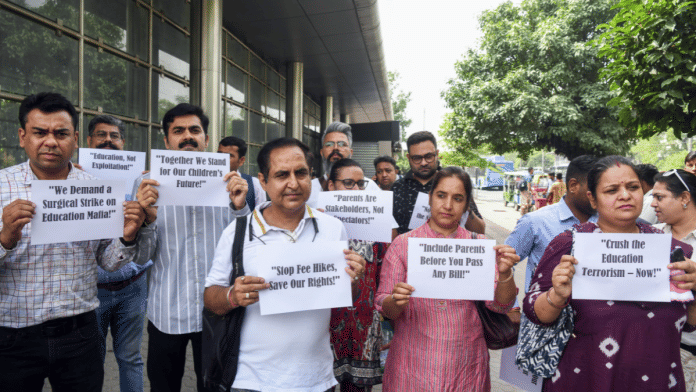New Delhi: The Delhi High Court has dismissed appeals filed by the Directorate of Education and student representatives, reaffirming that the DoE’s power to regulate the fee structure of unaided recognised schools is restricted solely to curbing profiteering and commercialisation.
In holding that the DoE’s regulatory power over private school fees is limited and cannot extend to imposing unqualified control over fee structures, the Thursday’s judgment settles a significant legal question under the Delhi School Education Act, 1973 (DSEA).
Almost 45 days after reserving the verdict, the Division Bench comprising Chief Justice D.K. Upadhyaya and Justice Tushar Rao Gedela upheld a single-bench judge’s decision delivered on 7 February 2024, which had quashed DoE orders prohibiting fee hikes by two unaided private schools.
The ruling clarifies that while the government has a duty to prevent financial exploitation in education, its authority does not include the power to dictate or freeze fee structures fixed by self-financed private institutions.
“The extent of such authority or power of the DoE is limited to ensure that profiteering, commercialisation and exploitation of education is kept under check so as not to permit the schools to earn profits and also to check that surplus is not used for a purpose other than education,” the court said.
Also Read: What’s in Delhi govt’s new private school fee regulation bill & why are parents concerned
Court reiterates limits of DoE’s powers
The appeals before the high court had challenged the single judge’s finding that the DoE was not empowered to exercise unrestricted control over the fees charged by unaided schools.
The bench observed that the directorate’s authority to regulate fees under Section 17(3) of the DSEA must be read in the context of judicial precedents that limit such power to preventing profiteering, commercialisation, and the charging of capitation fees.
“The DoE has the authority and power to regulate the fees to be charged by the unaided schools, however, such power or authority cannot travel beyond the measures to curb commercialisation, profiteering and indulgence in charging capitation fee,” the bench added.
It stressed that any regulation must ensure that fees charged by schools do not result in commercial gain, are not diverted for personal use, and that any surplus generated is utilised solely for the improvement and betterment of the institution.
The counsel appearing for the DoE and student representatives had relied heavily on the Supreme Court’s decision in the 2004 Modern School case, arguing that it permitted broad regulation of school fees by the government.
The High Court, however, held that such reliance was “highly misplaced” if the judgment was read in isolation, and clarified that the primary intent of the precedent was only to prevent malpractices.
The dispute
Two writ petitions were filed—one by Bluebells School International in Delhi’s Kailash Colony and the other by Lilawati Vidya Mandir Senior Secondary School—both privately managed, unaided institutions that do not operate on land granted or leased by the Delhi government.
The DoE had issued orders, dated 1 August 2018 and 20 April 2019, directing these schools not to increase their fees for the 2017-18 academic session, and requiring them to refund or adjust any increased amount collected from students.
The single judge had quashed these prohibitive directions, holding that the DoE’s power under the DSEA did not extend to imposing a blanket prohibition on fee increases.
Regulation only to ensure compliance
The division bench clarified that the DoE’s authority under Section 17(3) of the DSEA requires unaided schools to submit a statement of fees before the commencement of each academic year, a requirement intended to ensure transparency and compliance with the law.
The provision mandates that unaided schools’ income from fees shall be utilised only for educational purposes as prescribed by the act, and that any profit or surplus generated by the schools shall not be diverted for personal gain or for other business enterprises.
The bench said the process of fee fixation must take into account factors such as infrastructure, facilities, teaching and non-teaching staff salary, and plans for the expansion or improvement of the institution.
It emphasised that while regulatory oversight by the DoE is necessary to prevent financial misuse, such oversight cannot amount to direct control over the management’s discretion in setting fees.
The power of the government, the court said, is intended to ensure compliance with statutory provisions, not to supplant the autonomy of private educational institutions.
Although the HC upheld the quashing of the DoE’s earlier orders, it also reaffirmed the department’s authority to act against any violation of the law. The bench agreed with the single judge’s direction that the DoE retains the liberty to initiate a fresh examination of the schools’ fee structures and utilisation of funds if it believes there has been a breach of DSEA.
If, upon re-examination, the DoE finds any infraction of the statutory provisions, it may take appropriate action according to the act, including the withdrawal of recognition.
However, the court made it clear that any such decision must be taken only after giving schools concerned an opportunity of hearing, in accordance with the principles of natural justice and fair play.
(Edited by Sugita Katyal)
Also Read: Two realities of NEP: Sensory classrooms & hi-tech labs, to kids sitting on floor & no teachers






